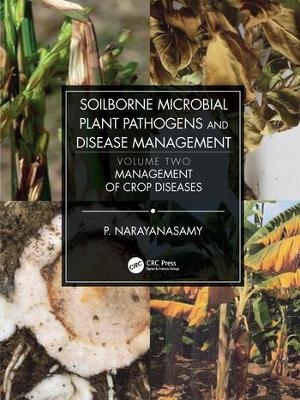
Soilborne Microbial Plant Pathogens and Disease Management, Volume Two
CRC Press (Verlag)
978-1-032-08732-0 (ISBN)
This second volume of a two-volume set focuses on the soilborne microbial plant pathogens and the diseases caused by them. The book provides information on ecology and epidemiology of soilborne microbial plant pathogens and various strategies applicable for effective management of diseases. Chapters cover exclusion and prevention strategies; improvement of host plant resistance; biological management; application of chemicals; and integration of these disease management strategies.
Features
Discusses various aspects of soilborne microbial plant pathogens to develop effective methods of managing diseases.
Presents information on epidemiology and ecology of soilborne microbial plant pathogens.
Facilitates the application of management strategies alone or in combination with others for effective suppression of disease development.
Features information on application of biotic and abiotic biological control agents (BCAs) to suppress pathogen development either by directly acting on the pathogen(s) or indirectly by enhancing host resistance to the pathogens.
Employs biotic and abiotic biocontrol agents either to replace or reduce the use of chemicals is an achievable approach for managing the soilborne microbial pathogens.
Prof. P. Narayanasamy was awarded the B.Sc.(Ag.) (1958), M.Sc.(Ag.) (1960), and Ph.D. (1963) degrees by the University of Madras and later the Rockefeller Foundation Fellowship to pursue Postdoctoral research on Rice Virus diseases at the International Rice Research Institute, Philippines during 1966 – 1967. He served as the Virus Pathologist at the Indian Agricultural Research Institute, New Delhi during 1969 – 1970. He returned to his Alma Mater which was upgraded as the Tamil Nadu Agricultural University (TNAU), Coimbatore in 1971. He was appointed as the Associate Professor and promoted later as the Professor and Head of the Department of Plant Pathology. He was elected as the Fellow of Indian Phytopathological Society, New Delhi. He functioned as the Editor of the Madras Agricultural Journal published from the Tamil Nadu Agricultural University Campus and as member of editorial committees of the Plant Pathology Journals published in India. He was invited to participate as the lead speaker and chairman of sessions in the National Seminars held in India. As a researcher in Plant Pathology, he was the leader of the projects on diseases of rice, legumes and oilseeds. He organized the National Seminar for the Management of Diseases of Oilseed Crops. His research on antiviral principles yielded practical solutions for the management of virus diseases affecting various crops. He published over 200 research papers in national and international journals. He was the Principal Investigator of several research projects funded by the Department of Science and Technology, Government of India, New Delhi and the International Crops Research Institute for Semi-Arid Tropics, Hyderabad, India. He continues to share his experience and knowledge with the staff and graduate students of the Department of Plant Pathology, TNAU, Coimbatore. As a teacher, he taught courses on Plant Virology, Molecular Biology, Physiopathology, and Crop disease management for Master and Doctoral programs. Under his guidance, graduate students (25) and research scholars (15) earned Master and Doctoral Degrees respectively. With long experience and in-depth knowledge on various aspects of microbial plant pathogens and crop disease management, he has authored 18 books published by leading publishers like Marcel Dekker, John Wiley, Science Publishers, The Haworth Press, and Springer Science. These publications cover various aspects of Plant Pathology and serve as source of information and well received by the intended audience. As the social obligation, he is deeply involved in the social welfare activities to help the orphaned old and infirm people, as well as children through Udavum Karangal (Coimbatore), HelpAge (New Delhi), Global Cancer Concern (New Delhi), CRY (Bangalore), and The Hindu Mission Hospital (Chennai) to lessen the sufferings of needy persons. As one interested in literature and spirituality, he has composed poems in Tamil and English and published two collections of poems to inculcate self confidence in the youth and spiritual exploration for the mature people.
Preface Chapter 1 Management of Soilborne Microbial Plant Pathogens - Exclusion and Prevention Strategies 1.1 Exclusion of Microbial Plant Pathogens 1.2 Soil Health Management 1.3 Physical Techniques 1.4 Chemical Techniques Chapter 2 Management of Soilborne Microbial Plant Pathogens: Improvement of Host Plant Resistance 2.1 Types of Disease Resistance 2.2 Host Plant Resistance to Soilborne Fungal Pathogens 2.3 Host Plant Resistance to Soilborne Bacterial Pathogens 2.4 Host Plant Resistance to Soilborne Viral Pathogens 2.5 Transgenic Resistance to Soilborne Microbial Pathogens Chapter 3 Management of Soilborne Microbial Plan Pathogens: Biological Management of Crop Diseases Chapter 3.1 Assessment of Biological Control Potential of Biotic Agents 3.2 Assessment of Biocontrol Potential of Abiotic Agents 4 Management of Soilborne Microbial Plant Pathogens: Chemical Application Chapter 4.1 Assessment of Activity of Chemicals Against Fungal Pathogens 4.2 Assessment of Activities of Chemicals Against Bacterial Pathogens5 Management of Soilborne Microbial Plant Pathogens: Development of Integrated Disease Management Systems 5.1 Components of Integrated Disease Management Systems 5.2 Management of Diseases of Agricultural Crops 5.3 Management of Diseases of Horticultural Crops References
| Erscheinungsdatum | 01.07.2021 |
|---|---|
| Zusatzinfo | 37 Illustrations, black and white |
| Verlagsort | London |
| Sprache | englisch |
| Maße | 210 x 280 mm |
| Gewicht | 1840 g |
| Themenwelt | Naturwissenschaften ► Biologie ► Botanik |
| Weitere Fachgebiete ► Land- / Forstwirtschaft / Fischerei | |
| ISBN-10 | 1-032-08732-3 / 1032087323 |
| ISBN-13 | 978-1-032-08732-0 / 9781032087320 |
| Zustand | Neuware |
| Informationen gemäß Produktsicherheitsverordnung (GPSR) | |
| Haben Sie eine Frage zum Produkt? |
aus dem Bereich


